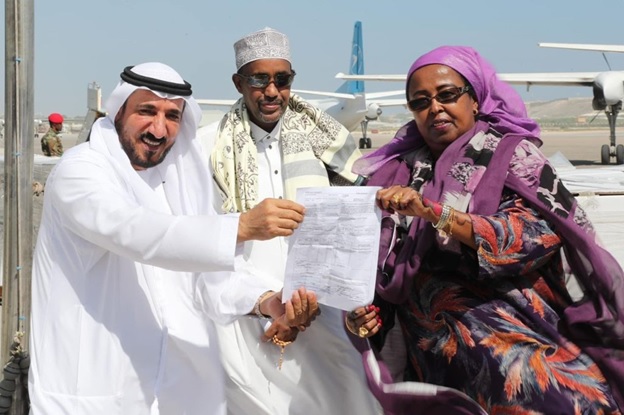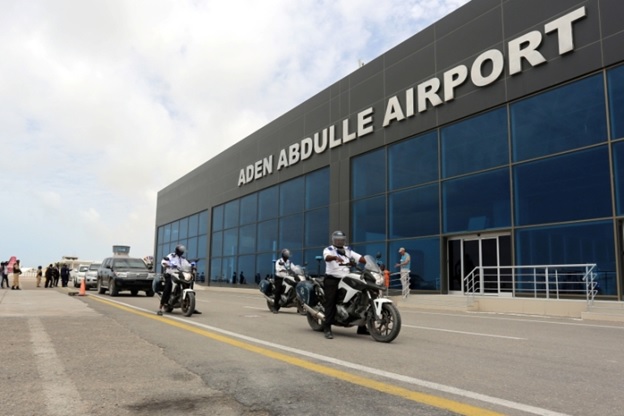By Mohamed Adam
On April 8, 2018, a Royal UAE jet landed at Adan Cade international airport. According to the reports at the time, the royal private jet did not notify its cash cargo to the Mogadishu Airport Authority, nor did it make the necessary pre-clearance arrangement for cash courier. The Somali government seized the cross-border cash transaction as soon as the USA $9.6 million entered at Mogadishu airport Jurisdiction.

This article does not intend to judge the current controversy related to the suspicious $9.6 million the prime minister wants to return to UAE, overriding the concerned government agencies. Rather, this article’s sole purpose is to inform the public about the international guidelines in dealing with cross[1]border transactions. And its implications to Somalia’s financial transparency, whether it’s the government obligation to its law (Somalia AML/CT act 2016), commercial banks, Hawala, or the financial inclusion at the grass-root level.
The problem with UAE cross-border transaction
Everyone is aware of the money laundering and terrorist financing threats to international peace and security; and the effect on the financial health of the global economy. Drugs such as Cocaine, Heroin, Marijuana, etc., are distributed by concealing them from the authorities: the source of their cash transactions, the purpose of the transaction, the sender, and the receiver of the illicit funds. Illicit cash is received, structured, and placed as investment and cash deposits through this complicated process.
Money launderers’ use of illicit money is not limited to buying properties with cash, depositing cash in banks, and buying insurance policies. Still, they hide the laundered cash in every conceivable financial instrument. The illicit drug lords use this financial prowess gained from money laundering to conceal their crimes. Concealment of financial instruments ranges from bribing, coercing, and killing uncooperative targets. They infiltrate national and multinational companies to legalize the flow of funds. They infiltrate politicians to influence the governments’ policies; they bribe or threaten law enforcement agencies, prosecutors, judges, and other competent authorities that have the power to disrupt illicit money laundering and terrorist financing.
As for terrorist financing, I don’t have to explain much more than a common person may know. Just relate to yourself how many innocent lives died, maimed, and disabled by the Al-Shabaab’s indiscriminate bombing of innocent people; the 911 victims and implications on the world; Isil in Iraq– not to mention state terrorism.
In this case, the $9.6 million undeclared qualifies as an illicit fund. The source was hidden, the receiver was unknown, and the purpose was concealed. Regarding the United Nations Security Council resolution and its agencies, the UAE cross-border transaction is a perfect case of a suspicious transaction or other forms of illegal financial activities.

The fact that the UAE Royal jet officials refused to answer the airport security question makes UAE cross-border transactions very suspicious. Again, according to cross-border transaction best practices, they should have been interrogated and arrested until their innocence or guilt is confirmed. In this incident, the onus is on the UAE to prove the legibility of the transaction. They must prove the legality of the $9.6 million beyond a reasonable doubt.
United Nations Security Council role on AML/CFT
Since the United Nations Security Council has oversight of world peace and security, It certainly has powers over money laundering and terrorist financing, bribing, the proliferation of mass destruction weapons. The UNSC passed the successive resolution for which the most comprehensive resolution is UNSCR 1373. In short, resolution 1373 has mandated financial Action Taskforce (FATF), a Paris-based organization, to oversee, legislate and provide AML/CFT guidance applicable to all countries of the world. Through FATF, countries can be black-listed from the world finance connectivity for AML/CFT non-compliance, a serious situation that hampers the development of any nation.
So what is at stake in the illicit $9.6 million seized at Mogadishu airport in April 2018? The FATF recommendation-16 mandates that any monetary value equal to or greater than $10,000 must be declared at the point of entry. Somalia’s AML/CFT Act 2016 aligns with FATF, as all nations do. The United Arab Emirates also has its AML/CFT Act. There is no excuse for the UAE government to carry undeclared funds to any amount equal to or greater than $10,000 at the point of entry of another country. The crew of the Royal jet and its passengers declared diplomatic immunity. But the UNSC resolutions implemented by the FATF organization do not mention diplomatic exceptions for cross[1]border transactions considered illicit funds.
According to Mr. Gargash, the UAE minister of state for foreign affairs, he said: “The money was for UAE training operations for Somalia forces.” However, the UAE payroll to such forces is far less than $100,000. Finally, the behavior of the UAE is not pursuant to the UNSC resolution, the FATF recommendations, Somalia’s AML/CFT Act, and the UAE AML/CFT Law. The concealment of this suspicious transaction, hiding the purpose, and covering up can lead to sanctioning countries and individuals involved in abetting and aiding this suspicious transaction.
Somalia’s Remedy to this issue
Somalia’s AML/CFT Act is aligned with UNSC resolutions and FATF recommendations. Therefore, it is prudent and lawful for Somalia to follow international standards in resolving this issue. Somalia has an independent agency, the financial reporting Center (FRC), the financial intelligence unit created to follow up cross-border and other suspicious transactions. In this case, the $9.6 million is a suspicious cross-border transaction.
The Somalia AML/CFT Act and FAFT recommendations provide guidance on over the limit cross-border transactions. FRC investigates the transactions, and if it finds that further investigation is required, it passes to the law enforcement, which in turn passes to the judiciary system upon confirming FRC findings. The final verdict is issued at the courts that rule the guilt or the innocence of the suspects, whether it is individual, organization, or country. According to the FATF recommendations, any government official, no matter the rank who interferes with this process, is condoning money laundering and terrorist financing and is liable to be sanctioned by the united nations, prosecuted, fined, or a combination of all.
The seized funds from the United Arab Emirates did not meet the AML/CFT compliance requirement. Therefore, Somalia has a lawful intention to seize that amount since it was not declared at Mogadishu International airport, the point of entry. Also, it is illegal for politicians to release the $9.6 million by using their powers. Releasing this amount without due process violates the Somalia AML/CFT Act, FATF recommendations for AM/CT, and the United Nations Security Council Resolutions.
What is at stake for Somalia?
The World Bank, the IMF, and the US government, to mention a few, invested millions of dollars on Somalia’s financial supervision capabilities through training, hiring consultants for Somalia’s AML/CFT compliance – a parameter in Somalia’s debt relief. Giving the money back to UAE without the cross[1]border transaction due process violates Somalia’s obligation to the UNSC. It would certainly impede Somalia’s effort to become a member of the world financial system. According to FATF, the governing body of UNSCR for AM/CFT, the United Arab Emirates violated all AML/CFT laws from national to international.
A more serious problem might be looming on this cross-border transaction. In 2023, Somalia would be tasked with Mutual Evaluation by the Middle East and North Africa Task Force ( MENATAF) on behalf of FATF. This Mutual Evaluation would concentrate on Somalia’s technical competence and effectiveness. Certainly, this UAE’s politicized illicit fund would be a cornerstone for the 2023 Mutual Evaluation. If Somalia does take appropriate remedial action or is politically unable to take one, Somalia is doomed to fail in the coming MENATAF Mutual Evaluation. The consequences of Somalia’s failure on mutual evaluation are very serious. It would affect the financial supervision’s capabilities and AML/CFT compliance efforts. It may also set back several years of compliance efforts of Hawala and commercial banks that would have led to corresponding banking relationships.
Mohamed Adam
Email: [email protected]
————–
Senior AML/CFT & financial Supervision Consultant Based in Somalia and Canada.
We welcome the submission of all articles for possible publication on WardheerNews.com. WardheerNews will only consider articles sent exclusively. Please email your article today . Opinions expressed in this article are those of the author and do not necessarily reflect the views of WardheerNews.
WardheerNew’s tolerance platform is engaging with diversity of opinion, political ideology and self-expression. Tolerance is a necessary ingredient for creativity and civility.Tolerance fuels tenacity and audacity.
WardheerNews waxay tixgelin gaara siinaysaa maqaaladaha sida gaarka ah loogu soo diro ee aan lagu daabicin goobo kale. Maqaalkani wuxuu ka turjumayaa aragtida Qoraaga loomana fasiran karo tan WardheerNews.
Copyright © 2024 WardheerNews, All rights reserved


